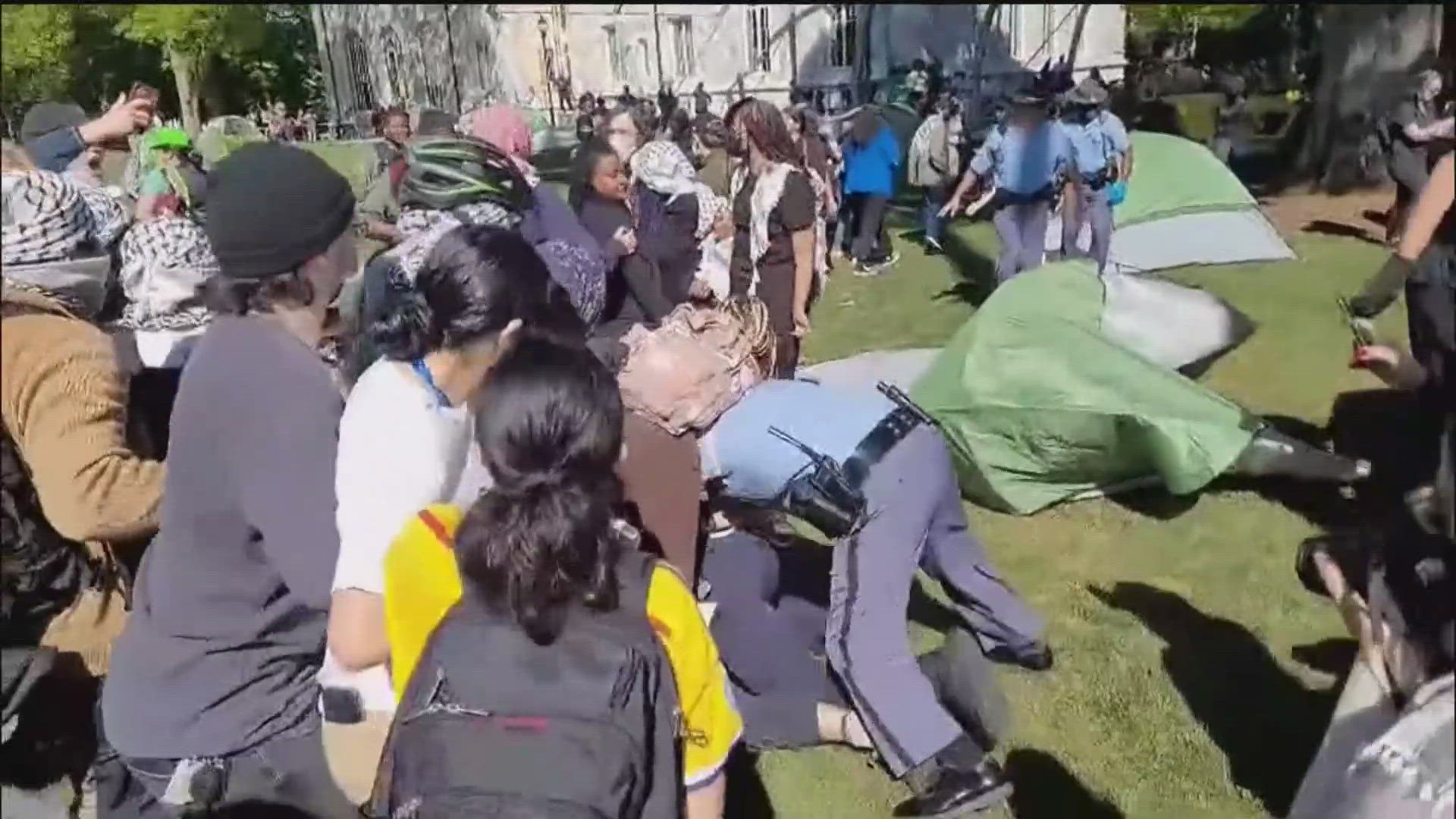DEKALB COUNTY, Ga. — A DeKalb County magistrate judge granted bond to some of the protesters who were arrested on Thursday after an Emory University protest turned explosive after their court hearings on Friday.
At least 24 of the 28 detained had their attorneys represent them in court, and some of them also appeared in front of the presiding judge.
While most of the defendants received criminal trespass charges, some received more serious charges, such as disorderly conduct, obstruction of law enforcement officers and other charges, which were largely misdemeanors.
Among those who appeared in court was Emory University Economics professor Caroline Fohlin, who was charged with disorderly conduct and simple battery of an officer.
The judge granted Fohlin a $50 bond, and she is awaiting release pending her posted bond. According to the DeKalb County Solicitor-General's Office, most of the defendants were granted signature bonds.
Another defendant, who is also a student, was granted a $75 cash bond on criminal trespass, obstruction of law enforcement officers and simple battery against an officer.
RELATED: Day of unrest at Emory after protests mushroom following contentious police clearing of encampment
During the first appearance hearing, Emory University's Interim Senior Vice President, Amy Adelman, appeared in front of the presiding judge to ask that faculty, staff, and students be released without restrictions.
This would allow students, faculty and staff to be on the university's campus for regular business without restricting them.
Four of the defendants who appeared in court were not students and, therefore, were banned from the university's campus and other buildings where Emory conducts business. Some were granted special conditions to be allowed at Emory's Hospital for their own personal reasons.
The rest of the defendants were students or related to the university. In a statement released from Emory University's President Greg Fenves, he confirmed that 20 "Emory University community members" were involved in the incident.
Demonstrators also received citations from the City of Atlanta for disorderly conduct, but not all of them are being charged with that.
According to the presiding judge, each defendant's next court date will be in state court within the next seven to 10 days.
So, what happened?
A massive crowd gathered at Emory University early Thursday morning as students and community members protested over the war in Gaza.
Students set up a protest encampment in support of Palestinians, with the school describing it in a statement as a "trespass." University officials soon rallied in heavy law enforcement descending on the campus quad, leading to a dramatic clash between the protesters and law enforcement.
Thursday evening, about 1,000 people gathered in the center of campus, taking a stand against the war. Law enforcement officers were also on-site as people chanted and held signs during the protest.
Many are calling for a cease-fire between Israel and Palestine.
Students told 11Alive's Bobeth Yates that there was also a sit-in at the Candler School of Theology. They would like to see their demands met, including releasing the protesters who were arrested earlier in the day, and they want their charges dropped. Some even said they are also willing to be taken into custody for the cause.
"We know that there's a chance that we will be met with that same level of force but we believe what's going on right now demands us put our bodies on the line," student Daniella Hobbs said.
Despite the number of students arrested and involved, Emory University's President Greg Fenves alleges the initial camp and protests stemmed from "highly organized, outside protesters" who came to campus in vans to "overtake the Quad just days after it was vandalized with hateful and threatening messages," calling that "deeply disturbing."
The chair of Emory's Philosophy Department, Noëlle McAfee, disputed this. McAfee was detained Thursday while observing the protests and told 11Alive's Brittany Kleinpeter she was there "standing up for students and their freedom of expression" and that there was an "issue of higher education administrators clamping down on free expression and delegitimizing any dissent."
Georgia Gov. Brian Kemp spoke about the mushroomed protests shortly after they dispersed, saying, "We will respect the right to peacefully protest, but those who choose to make the unwise decision to use our college campuses to intimidate, make threats, promote violence, or in any other way break the law will be met with the full force of the law and brought to justice."

